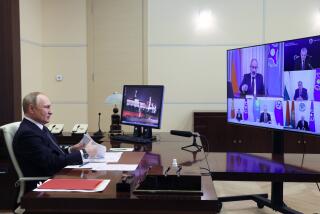Hammer, U.S. Allies Credited in Summit OK
- Share via
MOSCOW — A top Soviet journalist told a group of visiting American editors Thursday that Kremlin leader Mikhail S. Gorbachev’s decision to meet President Reagan was based in part on the desires of West European leaders.
Viktor G. Afanasyev, editor-in-chief of Pravda, the Communist Party newspaper, said the agreement to hold a summit resulted from long negotiations and that U.S. allies and American industrialist Armand Hammer played significant roles.
He said the announcement that Reagan and Gorbachev will meet in Geneva on Nov. 19-20 generated “a lot of enthusiasm” and that the summit should go far toward improving U.S.-Soviet relations.
Translated by Soviet
Afanasyev, meeting with a delegation of the New England Society of Newspaper Editors, spoke in Russian. A Soviet translator provided the English version, according to a member of the delegation.
“The allies, beginning with (British Prime Minister) Margaret Thatcher, and down the line, were very much in favor of such a meeting,” Afanasyev said. “Our leaders took that opinion into account. And of course, world opinion is very much in favor of such a meeting.”
He said the 87-year-old Hammer, who met for 1 1/2 hours with Gorbachev on June 17, “did quite a bit to facilitate” the negotiations leading to the summit agreement. Hammer is chairman and chief executive officer of Occidental Petroleum Corp. of Los Angeles.
‘Lot of Enthusiasm’
“I believe there is a lot of enthusiasm and a lot of positive reaction to the announcement,” the Pravda chief said.
Afanasyev said that two days “will not be enough to solve all the problems” and that perhaps no major developments would come out of the summit.
“But it will be a personal getting-acquainted by the leaders of two of the greatest countries in the world,” he said. “No doubt it will contribute to the normalization of relations between our countries.
“We will understand each other better and know each other better. We will learn about the problems that concern you and you will learn about the problems that concern us.”
More to Read
Sign up for Essential California
The most important California stories and recommendations in your inbox every morning.
You may occasionally receive promotional content from the Los Angeles Times.












